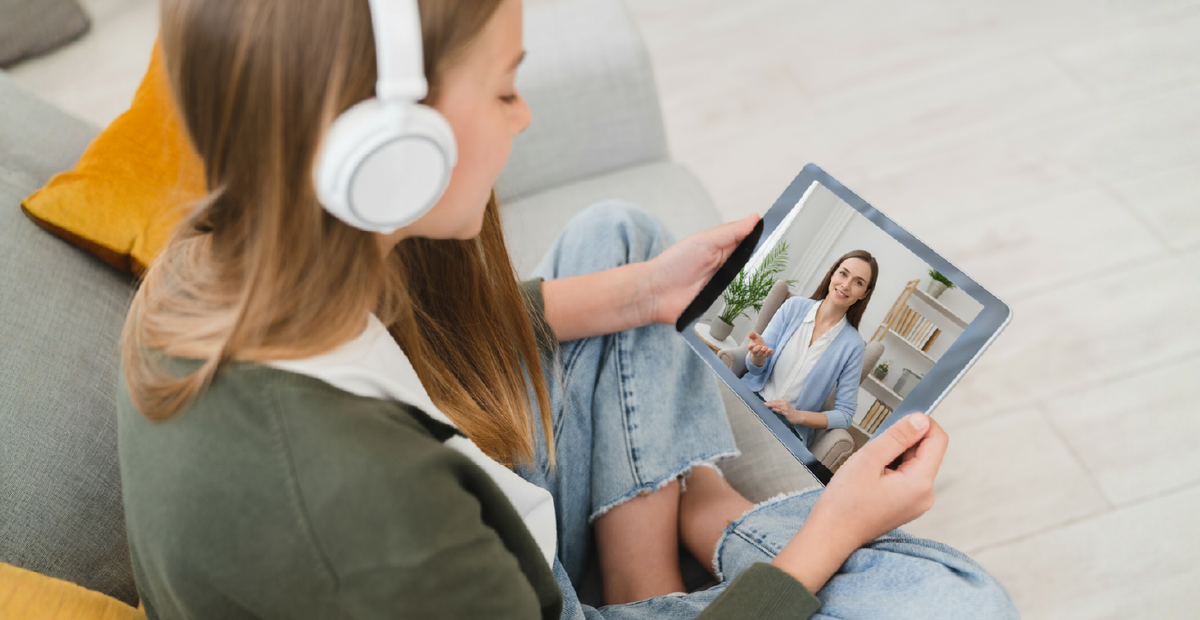Table of Contents

As teenage anxiety continues to rise, it’s normal for many parents to question if social media is to blame. Today’s teens are growing up in a highly digital world and social media plays a large role in their lives with 95% of teens reporting that they use it almost every day.
Social media can help teens connect with each other, get creative and learn new information. However, it can also cause several negative effects on the developing brain and increase the risk of depression & anxiety.
Understanding the risks of social media and its influence on teenage anxiety is helpful for parents to make informed decisions around their teens’ social media use.
Social Media & Mental Health Concerns
Social media can impact our overall wellbeing by increasing the risk of anxiety, depression, eating disorders, isolation and FOMO (fear of missing out). These issues are especially common among youth and young adults.
Social media can also become addictive. Ever wondered why we feel the need to check our phones so often? Social media releases dopamine in the brain. Anytime we make a post, receive a comment, like or DM—this feel good chemical gets released. Creating a cycle of pleasure & reward that can be difficult to break.
Social platforms often only display the best part of users’ lives. This can trigger feelings of dissatisfaction with our own lives, impact self esteem and cause anxiety.
While it can be beneficial to have access to information at our fingertips, this overload of information can also cause anxiety. Today people are flooded with posts, pictures and videos as soon as a political crisis, natural disaster or violent crime takes place. This can skew perceptions of the world by making certain events seem more common than they actually are.
Teenage Context: Social Media and Mental Health
Teenagers are more vulnerable to the risks of social media due to the sensitive nature of their brain. Regions that control reward-processing, focus, motivation and impulse control are still growing. Constant social media use is associated with changes in these areas making teens more emotionally reactive and sensitive to the pleasure-reward cycle.
Adolescence is also an era of identity exploration and finding one’s place in the world. This can make the self-esteem of teens more fragile. Teens may compare themselves with influencers, models and filtered photos—all of which can impact their self-esteem & cause anxiety.
Although social media can open doors for teens to communicate with each other no matter where they are physically located, this lack of face-to-face communication can cause an increase in social anxiety. Teens now speak more with each other through digital interactions such as Instagram reels, Snapchat and Tik Tok videos.
Excessive social media use can cause similar chemical responses to the developing brain as drugs & alcohol. The constant use of social media and bursts of dopamine may cause teens to constantly check their phone or have a spike of euphoria when they receive a notification. Like drugs, as social media use increases, the more engagement a teen will crave. This can be hard to break without interventions from adults or parents.
The surgeon general of the United States has even released a statement on social media use among teenagers, stating there is emerging research on the harm social media is causing to youth mental health.
When Social Media Becomes An Issue
Of course, social media is not all bad. It can connect teens with distant friends, teach them new information, provide a platform to be creative and express themselves. Teens may learn new hobbies on social media or receive helpful advice from others. However, it becomes an issue when it impacts functioning in their daily lives.
Some warning signs for parents to recognize when social media has become an issue include:
- Acting anxious after spending time on their phones
- Constantly checking their social media feeds
- Low self-esteem or negative self-perception
- Issues with body image
- Changes in sleep patterns (eg. insomnia)
- Disordered eating
- Rapid shifts in mood
- Aggression or irritability when they can’t be on their phone
- Social isolation
- Sudden academic decline
- Secretive behavior around online interactions
Strategies for Parents to Help Anxious Teens
Social media can impact any teen, however teens with anxiety are at an increased risk of experiencing negative side effects. Teens already prone to anxiety may struggle with self-esteem issues, FOMO and communication problems which are only heightened by their social media use.
Understanding the connection between teen anxiety and social media use can help parents provide more effective interventions. Some strategies for parents to help anxious teens and their social media use could include:
- Communicate with your teen about the risks of social media
- Actively listen to your teen and provide support during moments of anxiety
- Set time limits on cellphone use
- Provide context around social media and explain to them not everything they see reflects reality
- Encourage them to connect with others who struggle with anxiety or listen to podcasts that teach them about anxiety
- Promote mindfulness in the home (yoga, journaling, meditation, dance, art)
- Restrict screen time before bed to increase their quality of sleep
- Encourage them to turn off notifications and disconnect
- Carve out periods for quality time where you can do a digital detox together or as a family
Professional Help in Texas
If you identify warning signs of anxiety in your teen, reach out for professional support to help find the best plan of treatment. At Clearfork Academy our team of compassionate, licensed therapists understands the complex nature of teens. Reach out to our Admissions team to learn more.
Sources
Social Media and Youth Mental Health. The U.S. Surgeon General Advisory.
Austin Davis, LPC-S
Founder & CEO
Originally from the Saginaw, Eagle Mountain area, Austin Davis earned a Bachelor of Science in Pastoral Ministry from Lee University in Cleveland, TN and a Master of Arts in Counseling from The Church of God Theological Seminary. He then went on to become a Licensed Professional Counselor-Supervisor in the State of Texas. Austin’s professional history includes both local church ministry and clinical counseling. At a young age, he began serving youth at the local church in various capacities which led to clinical training and education. Austin gained a vast knowledge of mental health disorders while working in state and public mental health hospitals. This is where he was exposed to almost every type of diagnosis and carries this experience into the daily treatment.
Austin’s longtime passion is Clearfork Academy, a christ-centered residential facility focused on mental health and substance abuse. He finds joy and fulfillment working with “difficult” clients that challenge his heart and clinical skill set. It is his hope and desire that each resident that passes through Clearfork Academy will be one step closer to their created design. Austin’s greatest pleasures in life are being a husband to his wife, and a father to his growing children. He serves at his local church by playing guitar, speaking and helping with tech arts. Austin also enjoys being physically active, reading, woodworking, and music.





